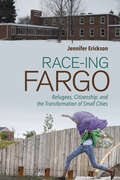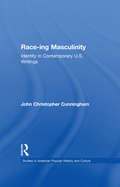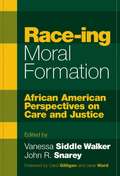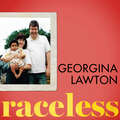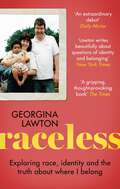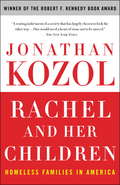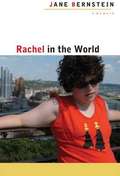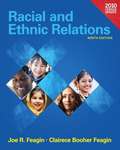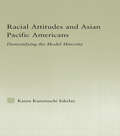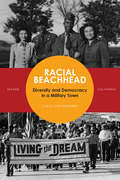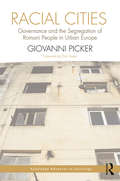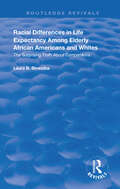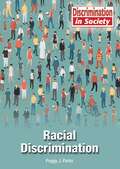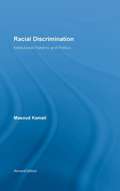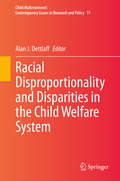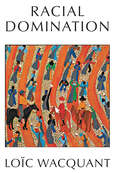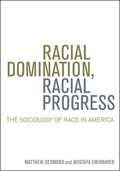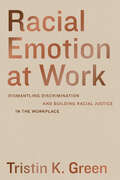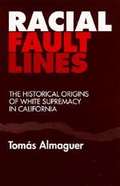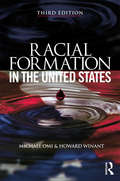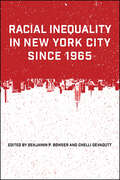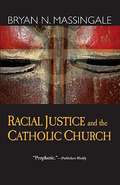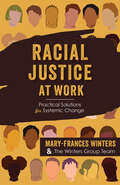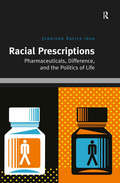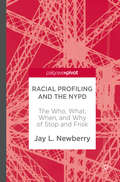- Table View
- List View
Race-ing Fargo: Refugees, Citizenship, and the Transformation of Small Cities
by Jennifer EricksonTracing the history of refugee settlement in Fargo, North Dakota, from the 1980s to the present day, Race-ing Fargo focuses on the role that gender, religion, and sociality play in everyday interactions between refugees from South Sudan and Bosnia-Herzegovina and the dominant white Euro-American population of the city. Jennifer Erickson outlines the ways in which refugees have impacted this small city over the last thirty years, showing how culture, political economy, and institutional transformations collectively contribute to the racialization of white cities like Fargo in ways that complicate their demographics. Race-ing Fargo shows that race, religion, and decorum prove to be powerful forces determining worthiness and belonging in the city and draws attention to the different roles that state and private sectors played in shaping ideas about race and citizenship on a local level. Through the comparative study of white secular Muslim Bosnians and Black Christian Southern Sudanese, Race-ing Fargo demonstrates how cross-cultural and transnational understandings of race, ethnicity, class, and religion shape daily citizenship practices and belonging.
Race-ing Masculinity: Identity in Contemporary U.S. Writings (Studies in American Popular History and Culture)
by John Christopher CunninghamFirst published in 2002. Routledge is an imprint of Taylor & Francis, an informa company.
Race-ing Moral Formation: African American Perspectives on Care and Justice
by Vanessa Siddle Walker John R. SnareyIn this volume the editors incorporate the experiences of African Americans into the discourse on moral-development theory and moral education. By citing historical developments from the days of slavery to the present, the authors provide a framework through which one can interpret the way morality has been cultivated amongst Black minorities. Presenting intriguing essays of well-known African American scholars, the editors discuss both the psychology of moral formation among African American children, adolescents, and adults, and the practical implications of this knowledge.
Raceless: Exploring race, identity and the truth about where I belong (Language Acts and Worldmaking #25)
by Georgina LawtonA GUARDIAN, SUNDAY TIMES, EVENING STANDARD AND COSMOPOLITAN BOOK OF THE YEAR FOR 2021In Georgina Lawton's childhood home, her Blackness was never acknowledged; the obvious fact of her brown skin, ignored by her white parents. Over time, secrets and a complex family story became accepted as truth and Georgina found herself complicit in the erasure of her racial identity.It was only when her beloved father died that the truth began to emerge. Fleeing the shattered pieces of her family life and the comfortable, suburban home she grew up in, at age 22 Georgina went in search of answers - embarking on a journey that took her around the world, to the DNA testing industry, and to countless others, whose identities have been questioned, denied or erased.What do you do when your heritage or parentage has been obscured in a complex web of deceit? How can you discuss race with your family, when you each see the world differently? When a personal identity has been wrongly constructed, how do you start again?Raceless is a beautifully-written true account of a young woman seeking her own story amid devastating family secrets. For readers of powerful, moving books about family, growing up and identity, such as My Name is Why by Lemn Sissay and Educated by Tara Westover.
Raceless: In Search of Family, Identity, and the Truth About Where I Belong
by Georgina Lawton'A jaw-dropping story, told deftly... a gripping, thought-provoking book.' The Sunday Times'Freshly fascinating. [Lawton] is a particularly astute observer of the psychological dislocation caused by growing up mixed race... and she writes beautifully about questions of identity and belonging, so central to each of us in finding our particular place in the world.' New York Times Book Review'A poignant and eye opening memoir...a nuanced and crucial dissection of race as a construct.' Yomi Adegoke, co-author of Slay in Your Lane'A beautifully written account of an extraordinary story, Raceless is as eye-opening as it is profound.' Otegha UwagbaA Guardian, Sunday Times, Evening Standard and Cosmopolitan book of the year for 2021'Ideas from our parents form the backbone to our identities, the bedrock to personal truths that we recite and remember like prayers from Church or poems from school. But they condition us in more powerful ways than lessons from any book or religion ever could. Now the tale had been destroyed. So what did that mean about who I thought I was?'In Georgina Lawton's childhood home, her Blackness was never acknowledged; the obvious fact of her brown skin, ignored by her white parents. Over time, secrets and a complex family story became accepted as truth and Georgina found herself complicit in the erasure of her racial identity. It was only when her beloved father died that the truth began to emerge. Fleeing the shattered pieces of her family life and the comfortable, suburban home she grew up in, at age 22 Georgina went in search of answers - embarking on a journey that took her around the world, to the DNA testing industry, and to countless others, whose identities have been questioned, denied or erased.What do you do when your heritage or parentage has been obscured in a complex web of deceit?How can you discuss race with your family, when you each see the world differently? When a personal identity has been wrongly constructed, how do you start again? Raceless is both the compelling personal account of a young woman seeking her own story amid devastating family secrets, and a fascinating, challenging and essential examination of modern racial identity.
Rachel and Her Children: Homeless Families in America
by Jonathan KozolThe story that jolted the conscience of the nation when it first appeared in The New Yorker. Jonathan Kozol is one of America's most forceful and eloquent observers of the intersection of race, poverty, and education. His books, from the National Book Award-winning Death at an Early Age to his most recent, the critically acclaimed Shame of the Nation, are touchstones of the national conscience. First published in 1988 and based on the months the author spent among America's homeless, Rachel and Her Children is an unforgettable record of the desperate voices of men, women, and especially children caught up in a nightmarish situation that tears at the hearts of readers. With record numbers of homeless children and adults flooding the nation's shelters, Rachel and Her Children offers a look at homelessness that resonates even louder today.
Rachel in the World: A Memoir
by Jane BernsteinWhat happens when love is no longer enough? Jane Bernstein thought that learning to accept her daughter's disabilities meant her struggles were over. But as Rachel grew up and needed more than a parent's devotion, both mother and daughter were confronted with formidable obstacles. Rachel in the World, which begins in Rachel's fifth year and ends when she turns twenty-two, tells of their barriers and successes with the same honesty and humor that made Loving Rachel, Bernstein's first memoir, a classic in its field. The linked accounts in part 1 center on family issues, social services, experiences with caregivers, and Rachel herself--difficult, charming, hard to fathom, eager for her own independence. The second part of the book chronicles Bernstein's attempt to find Rachel housing at a time when over 200,000 Americans with mental retardation were on waiting lists for residential services. As Rachel prepares to leave her mother's constant protection, Bernstein invites the reader to share the frustrations and unexpected pleasures of finding a place for her daughter, first in her family, and then in the world.
Racial And Ethnic Relations: Census Update
by Joe R. Feagin Clairece Booher FeaginRacial and Ethnic Relations, 9/e examines the "what", "why", and "how" of racial and ethnic oppression and conflict. Drawing on a broad array of sources, this text provides readers with access to important research and literature on racial and ethnic groups in the United States and, to a lesser extent, in certain other countries around the globe. It is designed for courses in Majority-Minority Relations, Racial and Ethnic Relations, Cultural Diversity, and Multiculturalism in departments of Sociology and Ethnic Studies. The Census Update program incorporates 2010 Census data into a course--simply and easily. The components of the Census Update Program include an updated census edition with all charts and graphs--to reflect the results of the 2010 Census.
Racial Attitudes and Asian Pacific Americans: Demystifying the Model Minority (Studies in Asian Americans)
by Karen Kurotsuchi InkelasThis study examines the complex sources and implications of the racial attitudes of Asian Pacific American (APA) college students, who, as one of the fastest growing demographics in higher education enrollments, play an increasingly significant role in campus race relations.
Racial Beachhead
by Carol Lynn MckibbenIn 1917, Fort Ord was established in the tiny subdivision of Seaside, California. Over the course of the 20th century, it held great national and military importance—a major launching point for World War II operations, the first base in the military to undergo complete integration, the West Coast's most important training base for draftees in the Vietnam War, a site of important civil rights movements—until its closure in the 1990s. Alongside it, the city of Seaside took form. Racial Beachhead offers the story of this city, shaped over the decades by military policies of racial integration in the context of the ideals of the American civil rights movement. Middle class blacks, together with other military families—black, white, Hispanic, and Asian—created a local politics of inclusion that continues to serve as a reminder that integration can work to change ideas about race. Though Seaside's relationship with the military makes it unique, at the same time the story of Seaside is part and parcel of the story of 20th century American town life. Its story contributes to the growing history of cities of color—those minority-majority places that are increasingly the face of urban America.
Racial Cities: Governance and the Segregation of Romani People in Urban Europe (Routledge Advances in Sociology)
by Giovanni PickerGoing beyond race-blind approaches to spatial segregation in Europe, Racial Cities argues that race is the logic through which stigmatized and segregated "Gypsy urban areas" have emerged and persisted after World War II. Building on nearly a decade of ethnographic and historical research in Romania, Italy, France and the UK, Giovanni Picker casts a series of case studies into the historical framework of circulations and borrowings between colony and metropole since the late nineteenth century. By focusing on socio-economic transformations and social dynamics in contemporary Cluj-Napoca, Pescara, Montreuil, Florence and Salford, Picker detects four local segregating mechanisms, and comparatively investigates resemblances between each of them and segregation in French Rabat, Italian Addis Ababa, and British New Delhi. These multiple global associations across space and time serve as an empirical basis for establishing a solid bridge between race critical theories and urban studies. Racial Cities is the first comprehensive analysis of the segregation of Romani people in Europe, providing a fine-tuned and in-depth explanation of this phenomenon. While inequalities increase globally and poverty is ever more concentrated, this book is a key contribution to debates and actions addressing social marginality, inequalities, racist exclusions, and governance. Thanks to its dense yet thoroughly accessible narration, the book will appeal to scholars, undergraduate and postgraduate students, postdoctoral researchers, and equally to activists and policy makers, who are interested in areas including: Race and Racism, Urban Studies, Governance, Inequalities, Colonialism and Postcolonialism, and European Studies.
Racial Differences in Life Expectancy Among Elderly African Americans and Whites: The Surprising Truth About Comparisons
by Laura B. ShresthaFirst published in 1997. This book is based on the author’s dissertation written while a student in the Population Studies Center of the University of Pennsylvania. The catalyst for the research was the recognition that major uncertainties exist about the quality of population and death data for the elderly in the United States as a result of coverage and content errors in the censuses and death registration. Furthermore, different patterns appear to exist for the two major racial groupings in the United States: whites and African- Americans. The book evaluates the consistency of reported data between the two major sources of data for calculation of mortality statistics in the United States: censuses and death registration. The focus is on the older population (aged 60 and above), where mortality trends have the greatest impact on social programs and where data quality is most problematic.
Racial Discrimination (Discrimination in Society)
by Peggy J. ParksThe term "racial discrimination" refers to people being treated unequally and unfairly solely because of their race. Although it is a considered a problem throughout the United States, not everyone agrees about the seriousness of it. <p><p> Racial Discrimination examines what this discrimination entails, how it is manifested, how widespread it is, how it affects real people, and efforts to address this discrimination.
Racial Discrimination: Institutional Patterns and Politics (Routledge Research in Race and Ethnicity)
by Masoud KamaliThere is an institutionalized dilemma in Europe that counteracts social cohesion and stability. It is a result of the collision and incompatibility between declarations of universal values (such as human rights and democracy) and institutionalized actions which exclude and discriminate against Europeans of immigrant background and against ethnic minorities. This book analyzes the institutional patterns and politics of ‘racial’ discrimination in modern-day Europe. Based on a research project that has been carried out under the leadership of the author in eight European countries, Racial Discrimination seeks the answers to some of the key questions posed by the latest developments in European political and public spheres concerning immigration and the increase in xenophobic sentiments and parties. The book will appeal to all social and political scientists interested in the latest political developments in Europe and in the problems of democratic citizenship and the efforts to move toward an integrated European community.
Racial Disproportionality and Disparities in the Child Welfare System (Child Maltreatment #11)
by Alan J. DettlaffThis volume examines existing research documenting racial disproportionality and disparities in child welfare systems, the underlying factors that contribute to these phenomena and the harms that result at both the individual and community levels. It reviews multiple forms of interventions designed to prevent and reduce disproportionality, particularly in states and jurisdictions that have seen meaningful change. With contributions from authorities and leaders in the field, this volume serves as the authoritative volume on the complex issue of child maltreatment and child welfare. It offers a central source of information for students and practitioners who are seeking understanding on how structural and institutional racism can be addressed in public systems.
Racial Domination
by Loïc WacquantRace is arguably the single most troublesome and volatile concept of the social sciences in the early 21st century. It is invoked to explain all manner of historical phenomena and current issues, from slavery to police brutality to acute poverty, and it is also used as a term of civic denunciation and moral condemnation. In this erudite and incisive book based on a panoramic mining of comparative and historical research from around the globe, Loïc Wacquant pours cold analytical water on this hot topic and infuses it with epistemological clarity, conceptual precision, and empirical breadth.Drawing on Gaston Bachelard, Max Weber, and Pierre Bourdieu, Wacquant first articulates a series of reframings, starting with dislodging the United States from its Archimedean position, in order to capture race-making as a form of symbolic violence. He then forges a set of novel concepts to rethink the nexus of racial classification and stratification: the continuum of ethnicity and race as disguised ethnicity, the diagonal of racialization and the pentad of ethnoracial domination, the checkerboard of violence and the dialectic of salience and consequentiality. This enables him to elaborate a meticulous critique of such fashionable notions as “structural racism” and “racial capitalism” that promise much but deliver little due to their semantic ambiguity and rhetorical malleability—notions that may even hamper the urgent fight against racial inequality.Wacquant turns to deploying this conceptual framework to dissect two formidable institutions of ethnoracial rule in America: Jim Crow and the prison. He draws on ethnographies and historiographies of white domination in the postbellum South to construct a robust analytical concept of Jim Crow as caste terrorism erected in the late 19th century. He unravels the deadly symbiosis between the black hyperghetto and the carceral archipelago that has coproduced and entrenched the material and symbolic marginality of the African-American precariat in the metropolis of the late 20th century. Wacquant concludes with reflections on the politics of knowledge and pointers on the vexed question of the relationship between social epistemology and racial justice.Both sharply focused and wide ranging, synthetic yet controversial, Racial Domination will be of interest to students and scholars of race and ethnicity, power and inequality, and epistemology and theory across the social sciences and humanities.
Racial Domination, Racial Progress: The Sociology of Race in America
by Mustafa Emirbayer Matthew DesmondThe book looks at race in a clear and accessible way, allowing students to understand how racial domination and progress work in all aspects of society.
Racial Emotion at Work: Dismantling Discrimination and Building Racial Justice in the Workplace
by Tristin K. GreenThis timely book unravels race and emotion in the workplace—exploring why racial emotion is often left out of equity conversations and why we must confront it.Racial Emotion at Work is an invitation to understand our own emotions and associated behaviors around race—and much more. With this surprising and timely book, Tristin K. Green takes us beyond diversity trainings and other individualized solutions to discrimination and inequality in employment, calling for sweeping changes in how the law and work organizations treat and shape racial emotions. Green provides readers with the latest research on racial emotions in interracial interactions and ties this research to thinking about discrimination and disadvantage at work. We see how our racial emotions can result in discrimination, and how our institutions—the law and work organizations—value and skew our racial emotions in ways that place the brunt of negative consequences on people of color. It turns out we need to reset our institutional and not just our personal radars on racial emotion to advance racial justice. Racial Emotion at Work shows how we can rise to the task.
Racial Fault Lines: The Historical Origins of White Supremacy in California
by Tomás AlmaguerThis book unravels the ethnic history of California since the late nineteenth-century Anglo-American conquest and institutionalization of "white supremacy" in the state. Almaguer comparatively assesses the struggles for control of resources, status, and political legitimacy between the European American and the Native American, Mexican, African-American, Chinese, and Japanese populations. Drawing from an array of primary and secondary sources, he weaves a detailed, disturbing portrait of ethnic, racial, and class relationships during this tumultuous time. The U. S. annexation of California in 1848 and the simultaneous discovery of gold sparked rapid and diverse waves of immigration westward, displacing the already established pastoral Mexican society. Almaguer shows how the confrontation between white immigrants and the Mexican ranchero and working class populations was also a contestation over racial status in which racialization influenced and was in turn influenced by class position in the changing economic order. Partly because of the Treaty of Guadalupe Hidalgo, which granted U. S. citizenship and other rights, parts of the Mexican population were integrated into the emerging Anglo society more easily than other racialized groups. A case study of Ventura County highlights declining political and economic fortunes of the Mexican elite while showing how Mexican, Japanese, Chinese, and Indian populations were permanently relegated to the bottom of the class structure as unskilled manual workers. The fate of the Native American population provides perhaps the most extreme example of white supremacy during the period. Popular conceptions of Native Americans as "uncivilized and "heathen," justified the killing of more than 8,000 men, women, and children between 1848 and 1870. Many survivors were incorporated at the periphery of Anglo society, often as indentured laborers and virtual slaves. Underpinning the institutional structuring of white supremacy were notions such as "manifest destiny," the inherent good of the capitalist wage-system, and the superiority of Christianity and Euro-American culture, all of which helped to marginalize non white groups in California and justify Anglo-American class dominance. As other racialized groups assumed new roles, Almaguer assesses the complex interplay between economic forces and racial attitudes that simultaneously structured and allocated "group position" in the new social hierarchy. California remains a contested racial frontier, as political struggles over the rights and opportunities of different groups continue to reverberate along racial lines. Racial Fault Lines is an invaluable contribution to our understanding of ethnicity and class in America, and the social construction of "race" in the Far West.
Racial Formation in the United States
by Howard Winant Michael OmiTwenty years since the publication of the Second Edition and more than thirty years since the publication of the original book, Racial Formation in the United States now arrives with each chapter radically revised and rewritten by authors Michael Omi and Howard Winant, but the overall purpose and vision of this classic remains the same: Omi and Winant provide an account of how concepts of race are created and transformed, how they become the focus of political conflict, and how they come to shape and permeate both identities and institutions. The steady journey of the U.S. toward a majority nonwhite population, the ongoing evisceration of the political legacy of the early post-World War II civil rights movement, the initiation of the 'war on terror' with its attendant Islamophobia, the rise of a mass immigrants rights movement, the formulation of race/class/gender 'intersectionality' theories, and the election and reelection of a black President of the United States are some of the many new racial conditions Racial Formation now covers.
Racial Inequality in New York City since 1965
by Benjamin P. Bowser; Chelli DevaduttIn the past, the study of racial inequality in New York City has usually had a narrow focus, examining particular social problems affecting ethnic-racial groups. In contrast, this book provides a comprehensive overview of racial inequality in the city's economy, housing, and education sectors over the last half-century. A collection of original essays by some of New York's most well-known and emerging urban experts, Racial Inequality in New York City since 1965 explores what city government has done and failed to do to address racial inequality. It examines the changes in circumstances of Asian, Latino, West Indian, and African American New Yorkers, outlining how theirs have either improved or deteriorated relative to their white counterparts. The contributors also analyze how practices and policies in policing, public housing, public health, and community services have maintained racial inequality and discuss how political participation can increase social capital among city residents in order to reduce racial inequality. The book concludes by offering a compendium of practical recommendations and actions that can be implemented to address racial inequality in the city.
Racial Justice and the Catholic Church
by Bryan N. MassingaleRacial Justice and the Catholic Church examines the presence of racism and the resources within Catholic teaching and within the black experience, particularly the work of Martin Luther King, Jr. that can combat it and promote reconciliation and justice.
Racial Justice at Work: Practical Solutions for Systemic Change
by Mary-Frances Winters The Winters Group TeamCreating justice-centered organizations is the next frontier in DEI. This book shows how to go beyond compliance to address harm, share power, and create equity. Traditional DEI work has not succeeded at dismantling systems that perpetuate harm and exclude BIPOC groups. Proponents of DEI have put too much focus on HR solutions, such as increasing representation, and not enough emphasis on changing the deeper organizational systems that perpetuate inequities-in other words, on justice. DEIJ work diverges from traditional metrics-driven DEI work and requires a new approach to effectively dismantle power structures.This thought-provoking, solutions-oriented book offers strategic advice on how to adopt a justice mindset, anticipate and address resistance, shift power dynamics, and create a psychologically safe organizational culture. Individual chapters provide pragmatic how-to guides to implementing justice-centered practices in recruitment and hiring, data collection and analysis, learning and development, marketing and advertising, procurement, philanthropy, and more. DEIJ pioneer Mary-Frances Winters and her coauthors address some of the most significant aspects of adding a justice focus to diversity work, showing how to create a workplace culture where equity is not a checklist of performative actions but a lived reality.
Racial Prescriptions: Pharmaceuticals, Difference, and the Politics of Life
by Jonathan Xavier IndaIn the contemporary United States, matters of life and health have become key political concerns. Important to this politics of life is the desire to overcome racial inequalities in health; from heart disease to diabetes, the populations most afflicted by a range of illnesses are racialized minorities. The solutions generally proposed to the problem of racial health disparities have been social and environmental in nature, but in the wake of the mapping of the human genome, genetic thinking has come to have considerable influence on how such inequalities are problematized. Racial Prescriptions explores the politics of dealing with health inequities through targeting pharmaceuticals at specific racial groups based on the idea that they are genetically different. Drawing on the introduction of BiDil to treat heart failure among African Americans, this book contends that while racialized pharmaceuticals are ostensibly about fostering life, they also raise thorny questions concerning the biologization of race, the reproduction of inequality, and the economic exploitation of the racial body. Engaging the concept of biopower in an examination of race, genetics and pharmaceuticals, Racial Prescriptions will appeal to sociologists, anthropologists and scholars of science and technology studies with interests in medicine, health, bioscience, inequality and racial politics.
Racial Profiling and the NYPD
by Jay L. NewberryThis book analyzes New York City's stop-and-frisk data both pre- and post-constitutionality ruling, examining the existence of both profiling and unequal treatment among the three largest groups identified in the database: Blacks, Whites, and Hispanics. The purpose for using these two time periods is to determine which group(s) benefited the most from the ruling. This research goes beyond standard statistics to identify the place that race holds in contributing to the stop disparities. Specifically, this research will adds a spatial element to the numbers by analyzing the determinants of stop location by race, applying a principal component analysis to a mixture of census and stop-and-frisk data to determine the influence of location on stops by race. The results present a way of determining the plausibility of stops being the product of racial profiling-or just a matter of happenstance.
